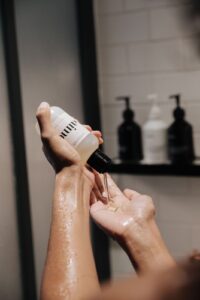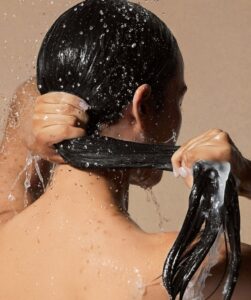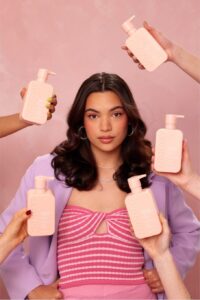We’ve all seen the glossy promise: hair that’s smooth, shiny, and extra swishable. Often, the secret behind that salon-worthy finish lies in one ingredient group — silicones. But while some swear by them, others have declared them public enemy number one. So, what’s the truth? Are silicones in shampoo bad? To get a clearer picture, we spoke with dermatologist Dr Thalha, who helped decode the science (and myths) behind silicones in shampoos.
Related: What’s In Your Shampoo: Are Sulphate-Free Shampoos A Marketing Tactic? Or Are They Actually Better?
Why are silicones used in shampoo?

Silicones are a large family of synthetic compounds made from silicon and oxygen atoms, often mixed with other elements to alter their texture or behaviour. In shampoos and conditioners, they’re used as conditioning agents that coat the hair shaft, offering a smoother, shinier, more manageable finish. “They basically form a very thin, flexible film around each strand of hair,” explains Dr Thalha. “This smooths the outer layer, the cuticle, making the hair feel soft, tangle-free, and less frizzy.” If you’ve spotted dimethicone, cyclopentasiloxane, or amodimethicone on your bottle, you’ve been using silicones.
The main reason silicones are used is simple: they work. They help reduce friction during washing and styling, which means fewer tangles and less breakage. Some even provide a measure of heat protection. “Silicones in shampoos are used to make hair smoother, shinier, and more manageable, delivering a sleek finish right from the wash,” says Dr Thalha. Silicones also come in different types. Water-soluble ones rinse out more easily and are less likely to build up, while non-water-soluble versions stick around longer and give more intense conditioning, though they need a proper cleanse to remove.
Do silicones in shampoo cause buildup?

Here’s where things get a bit murky. While silicones themselves aren’t harmful, the build-up of non-soluble silicones can lead to issues. “Hair strands aren’t living tissue, so they can’t technically be suffocated”, clarifies Dr Thalha. “But if too many layers pile on, it can become harder for water or nourishing treatments to get through. That’s when hair starts feeling heavy or dry at the ends.”
The solution? Dr Thalha says, “Using a clarifying or sulfate-containing shampoo occasionally, or choosing lighter or water-soluble silicones, helps avoid this issue while still enjoying the smoothing and protective benefits.”
Do silicones repair hair?
One thing to remember is that silicones don’t actually repair damage. They don’t make hair healthier from the inside out; they just make it look that way. “Silicones provide instant cosmetic benefits that improve the look, feel, and manageability of hair,” says Dr Thalha. “The improvement is mainly cosmetic and protective, not regenerative. For lasting hair health, you need a solid routine with ingredients that truly nourish.”
That said, the protective layer silicones offer does help prevent damage from heat styling, brushing, and exposure to the elements. In that sense, they support hair health indirectly.
Are silicones right for everyone?

Not necessarily. People with very fine or thin hair might find that heavy silicones make their hair feel limp. Those with oily scalps might also find they get greasy faster, especially if they’re not clarifying regularly. For those with scalp conditions such as dandruff, excess product buildup from silicones or other heavy styling agents can sometimes worsen flaking or irritation if the scalp is not cleansed well. It’s less about the ingredient being harmful and more about how it’s used.
“Silicone-free doesn’t always mean better,” warns Dr Thalha. It’s become a popular label in the clean beauty space, but the benefits or drawbacks depend entirely on your hair type and routine. What is worth noting is the environmental impact. Some silicones, especially the heavier ones, don’t break down easily and can persist in water systems. However, newer formulations are emerging that are lighter, more volatile, and more biodegradable, making them a better choice for both your hair and the planet.
If you’re keen to avoid silicones, there are natural alternatives, though they’re not perfect. “Oils like argan or jojoba, or conditioning butters, can work well, but they can feel greasy if overused. It all depends on formulation and hair type…If you love what silicones do for your hair, keep using them but just be smart about cleansing,” advises Dr Thalha. And if they’re not for you, that’s okay too. There are plenty of good alternatives out there. It’s about finding what suits your hair, your lifestyle, and your values.
To connect with dermatologist Dr Mohammed Thalha for more personalised skin and hair care advice, find them here.
Featured Image Source
Related: What’s In Your Shampoo: Do Parabens Cause Cancer Or Is It Fake News?

 Web Stories Title
Web Stories Title











